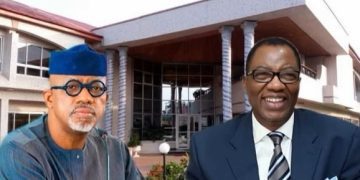By Yahaya Balogun
President Bola Ahmed Tinubu plays political chess, but not political checkers. Political checkers were played by the late Chief Obafemi Awolowo! Awo played good-man politics, but Jagaban is playing strategic good-man political trouble. Playing good political trouble seems to be the only recipe for success for any determined leadership in Nigeria.
The phrase ‘chess, not checkers’ is an idiom inspired by the differences between the games of chess and checkers. Because chess is more strategic than checkers, the phrase refers to planning ahead and thinking about your end goals when making important decisions without minding whose ox is gored.
This piece explains the game of chess concerning PBAT’s ever-strategic political planning in Nigerian geopolitics. It is not by happenstance that Tinubu remains the only political scion of the late Chief Obafemi Jeremiah Oyeniyi Awolowo. PBAT has mastered Awo’s political and economic policies, but not Awolowo’s gentlemanly politics. To understand the metamorphosis of Tinubu in the political camp of Awoists, it’s pertinent for Gen Z to understand the synopsis of the man, Awo, and his political persona in the political and anthropological life of our geopolitics in Nigeria.
Chief Obafemi Jeremiah Oyeniyi Awolowo, GCFR (Yoruba: Ọbáfẹ́mi Awólọ́wọ̀) was born on 6 March 1909 and died on 9 May 1987. He was a Nigerian socialist, nationalist, and statesman who played a key role in Nigeria’s independence movement, the First and Second Republics, and the Civil War. The son of a Yoruba farmer, he was one of the truly self-made men among his contemporaries in Nigerian politics.
As a young man, Chief Awolowo was an active journalist, editing publications such as the Nigerian Worker. After receiving his Bachelor’s of Commerce degree in Nigeria, he traveled to London to pursue his degree in law. Obafemi Awolowo was the first premier of the Western Region and later federal commissioner for finance and vice chairman of the Federal Executive Council during the Civil War.
A native of Ikenne in Ogun State of southwestern Nigeria, the late Chief Obafemi Oyeniyi Awolowo started his career, like some of his well-known contemporaries, as a nationalist in the Nigerian Youth Movement, in which he rose to become Western Provincial Secretary. Awolowo was responsible for much of the progressive social legislation that has made Nigeria a modern nation. The Awoist Bola Ahmed Tinubu has learned political strategies from Awo’s school of politics.
In recognition of all these, Awolowo was the first individual in the Nigerian modern political era to be named Leader of the Yorubas (Yoruba: Asiwaju Awon Yoruba or Asiwaju Omo Oodua). Asiwaju Bola Ahmed Tinubu was eminently conferred with the Asiwaju title due to his strategic leadership in the conscious cultural heritage of Yorùbáland.
Obafemi Awolowo was thrice a major contender for his country’s highest office. Unlike Tinubu, the late Chief Obafemi Awolowo failed to be president of the Federal Republic of Nigeria because of Awo’s political correctness, non-political roguishness, and strategy. What the late Chief Obafemi Awolowo could not achieve in his political lifetime is destined to be realized under Tinubu’s political roguishness, strategy, savviness, and all-inclusiveness.
Consequently, Tinubu’s political adversaries are oblivious to the political chess player called PBAT or Jagaban. PBAT appropriates all the political leverage and checkers of the late Chief Obafemi Awolowo to reorder Nigeria. Unfortunately, PBAT’s political enemies fail to see the reality of a man who has long dreamed and built Emilokan’s axiom into his future political aspirations. Jagaban’s political adversaries suffer more from their political imagination than reality.
Lastly, it’s inconsequential but morally necessary to encourage President Bola Ahmed Tinubu to ensure that his two years of sweeping strategic economic reforms begin to positively impact the lives of ordinary citizens in Nigeria. PBAT seems poised to realize just that as he moves toward economic prosperity and development for all Nigerians.
Yahaya Balogun wrote from Arizona, United States of America.









































